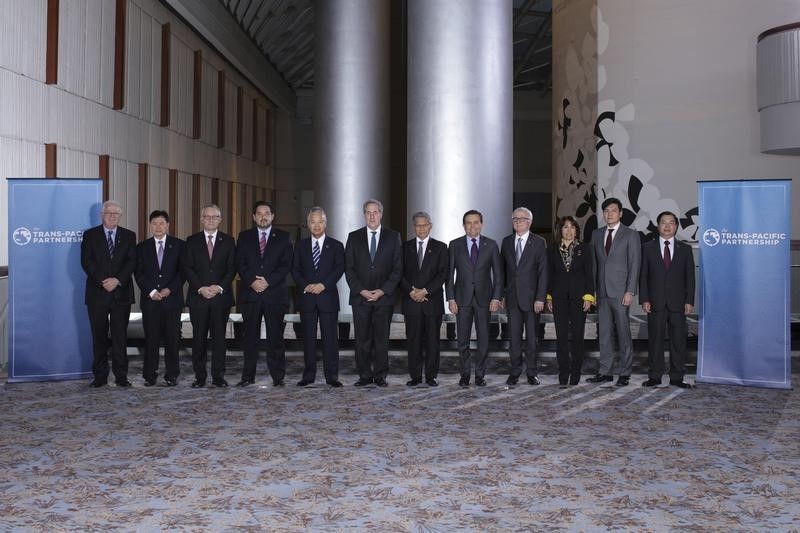* Trans Pacific Partnership free-trade deal signed on Monday
* Covers 12 Pacific Rim countries, 40 pct of world economy
* Companies say it falls sort of promised ambitions
* Some complain U.S. is biggest beneficiary
By Jane Wardell
SYDNEY, Oct 6 (Reuters) - Early industry reaction to a
historic trade agreement reached between 12 Pacific Rim
countries on Monday amounted to faint praise that it could have
been worse and umbrage that the United States appeared to be the
biggest winner.
The Trans-Pacific Partnership (TPP), aimed at liberalising
commerce across nations accounting for 40 percent of the world's
economy, was signed late on Monday after five difficult years of
talks, though it still needs ratification by each country.
Initial ambitions for the deal, covering an enormous range
of products and services from kiwifruit to semiconductors, were
clipped back in many areas to find agreement. There was also
concern that the summary made public didn't disclose the detail
where the devils might lurk.
New Zealand's Fonterra FCG.NZ , the world's biggest dairy
exporter, said the deal, which would cut tariffs on 93 percent
of its exports to the United States, fell "far short" of its
original ambition to eliminate all tariffs, blaming "entrenched"
U.S. protectionism.
Still, Wilson said the deal was a "small but significant"
step forward for the dairy sector with "some useful gains" for
New Zealand dairy exporters to key TPP markets such as the
United States, Canada and Japan.
The politically influential Dairy Farmers of Canada were
similarly muted, highlighting financial losses, albeit mitigated
by a "fair compensation package".
Beef, sugar, rice, seafood and horticulture companies in
Australia and New Zealand welcomed the increased access to
Japanese markets thanks to tariff reductions under the deal.
"We should focus on the gains made in this agreement for
Australian sugar, and not the success of the powerful U.S. sugar
lobby in maintaining their protectionist stance against bringing
sugar into their deficit market," said Dominic Nolan, chief
executive of the Australian Sugar Milling Council.
LOST CONCESSIONS
In India, there was concern that exports to the U.S. would
be hit because of the loss of zero-duty export concessions.
"If the deal is implemented, India's exports of products
like textile and leather will be severely affected," said
Abhijit Das, head of the Centre for WTO studies, a think-tank
run by India's Ministry of Commerce and Industry.
It could even, he suggested, nudge India into restarting
negotiations on a free-trade agreement with the European Union.
Among those expected to welcome the deal are U.S.-based
global e-commerce companies like Google GOOGL.O and Uber
UBER.UL , who will have restrictions removed on sales into
foreign markets, including existing requirements that they
establish local infrastructure.
The U.S. Trade Representative office welcomed the
"cutting-edge rules to promote internet-based commerce - a
central area of American leadership".
Australian Retailers Association executive director Russell
Zimmerman said it was too early to say how those measures would
affect local retailers but warned there was a risk of harm
"unless barriers are also lifted for Australian retailers going
overseas".
Even in areas where the Obama administration compromised,
such as cutting the monopoly period for new biologic drugs,
companies were grudging in their welcome.
Osamu Nagayama, chairman and chief executive of Japan's
Chugai Pharmaceutical Co Ltd 4519.T , which sells such drugs in
the United States through Switzerland's Roche ROG.VX , was
grateful that the settlement didn't drop below eight years as
the protection period.
"That said, given the current R&D environment, shortening
the data protection period would be challenging for the overall
pharmaceutical industry," he added.
